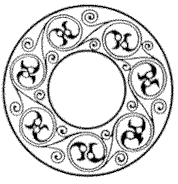
 |
The Celtic Englishes |
The Role of the English Language in
|
|
Ireland, Scotland, Wales, and Cornwall became England's first colonies from the twelfth century. In each of these a Celtic Language was spoken. Today those Celtic Languages are all in decline, some more than others. Much linguistic research has been devoted to the study of those declining Celtic Languages. By contrast, very little work has been done on the varieties of English spoken nowadays in those formerly monoglot Celtic territories.
There seem to be several reasons for this neglect -- political, social,
and economic. Not least was the acceptance of England and its language
as the linguistic norm. Today, ethnic variants of English enjoy both social and academic respect.
The prestige and status of Celtic Englishes have also increased.
Celtic Englishes were also transported into England's overseas
colonies, wherever Irish, Scottish, Welsh, and Cornish people went as
indentured labourers, convicts, or adventurers. Each variety made its
own contribution -- for instance, the Scotch-Irish to the making of American
English.
Very little research has so far been done into the fascinating range of Celtic Englishes used in these countries. This research project rectifies that neglect and consider such controversial matters as the relative importance of the Celtic component in those languages -- whether a present-day diaspora dialect is mainly the descendant of planters' English, or is based on transfer from a Celtic Language brought to a particular country by the immigrants. This leads to the most important question of all -- to what extent English itself, which is different from all other Germanic languages, has been celticized by its long association with the Celtic Languages in the British Isles. The controversial issue of post-colonial language identity has been the subject of a series of colloquia held at the University of Potsdam, Germany. The proceedings are published in the present series: Volume 1 provides the first critical survey of all the work undertaken so far in the field of Celtic Englishes, with an invaluable up-to-date Bibliography. Volume 2 describes and evaluates the competing theoretical approaches used so far in the study of Celtic Englishes. Volume 3, based on the 2001 Symposium, correlates dialectology with other academic disciplines -- archaeology, history, linguistics, and the study of literary dialects -- so as to establish the crucial significance of the Celtic Englishes in the context of modern multi-cultural society. Volume 4, The central concern of the fourth and final colloquium of studies on language contact between English and the Celtic languages at the University of Potsdam was the question of what is "Celtic" and what is universal in the "Celtic Englishes". View also the related Finnish project site on "English and Celtic in Contact" at http://www.joensuu.fi/fld/ecc/. A comprehensive bibliography on the Celtic Englishes is under construction and will be issued in 2007. Please contact me under <hildegard.tristram "at" anglistik.uni-freiburg.de> for a pre-publication copy. |